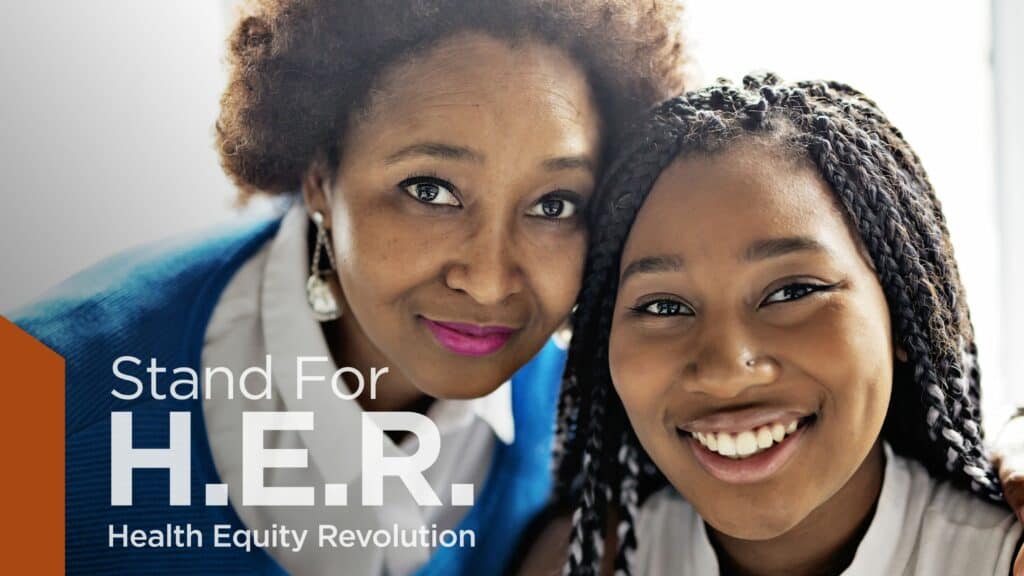
Kim Johnson, MD
Senior Director, Stand for H.E.R.
Lisa Hinton, MPH
Senior Manager, Stand for H.E.R
The Black Woman. For years poets have called her ‘phenomenal,’ artists have tried to capture her essence on canvas, economists have described her as a bedrock of the U.S. economy and now our nation calls her Vice President. Many of us in the Black community view the Black woman as the quintessential glue that holds it all together. Despite recent scientific advancements and the growing economic and political power of Black women in the U.S., this progress has not translated into gains in the health care and health outcomes of Black women. In fact, we are losing Black women disproportionately to a myriad of diseases including breast cancer. Black women are about 40 percent more likely to die of breast cancer than white women. We are often diagnosed at younger ages, at later stages and with more aggressive breast cancers leading to limited and costly treatments with poor prognosis.
“Health equity means that everyone has a fair and just opportunity to be as healthy as possible. This requires removing obstacles to health such as poverty, discrimination, and their consequences, including powerlessness and lack of access to good jobs with fair pay, quality education and housing, safe environments, and health care.”1 However, Black women are often impacted by multiple intersectional barriers including the combined effects of racial, gender, ethnicity, and other forms of bias while navigating systems and institutional structures in which entrenched inequities remain the status quo.
Susan G. Komen® has detailed in a new report, Closing the Breast Cancer Gap: A Roadmap to Save the Lives of Black Women in America, the underlying causes of breast cancer inequities across the breast cancer care continuum among Black women, with a focus on systemic and social determinants of health. As detailed in the report, understanding and effectively addressing Black and white disparities in breast cancer requires a rigorous understanding of Black women’s lived experiences of racism and biases, segregation through redlining, psychosocial stress, the disproportionate burden of social and environmental assaults and how these experiences undermine health and contribute to breast cancer mortality.
The study also sought to understand the unique drivers of breast cancer disparities in 10 U.S. metropolitan areas where the breast cancer inequities are the greatest. The results yielded Black women experience higher rates of death from breast cancer due to a combination of factors, including barriers to early diagnosis, the aggressive nature of certain breast cancers that are more prevalent in Black women (Triple-Negative Breast Cancer, for example), genetics (mutations in BRCA1/BRCA2 genes), lack of quality care, discrimination and systemic racism.
According to the report:
- Many health care facilities that provide quality care do not take patients who are on Medicaid, Medicare or other lower-cost health exchange plans. Black women who are on these plans often feel they are discriminated against, even when the hospital accepts that insurance.
- Although data show that many Black women are being screened, the qualitative data from the focus groups pointed to confusion about the varying, current screening recommendations (from the American Cancer Society, the American College of Radiology and the United States Preventative Services Task Force).
- Black women are also more likely than white women to be diagnosed with aggressive breast cancers, such as Triple-Negative Breast Cancer and inflammatory breast cancer, and are more likely to be diagnosed at a later stage, when treatments are limited, costly and the prognosis is poor.
- There are barriers plaguing access to genetic counseling and testing services in the Black community. These services are valuable for those with a family health history of cancers to determine whether genetic mutations known to cause increased risk for breast and other cancers, such as mutations in BRCA1/BRCA2 genes, are present.
- The quality of health care is segregated, with National Cancer Institute Cancer Centers and major academic institutions located in predominately white neighborhoods, while Black communities are often supported by community clinics that often do not meet quality standards of care.
- Providers, patient navigators and Black women in focus groups all noted how important the doctor—patient relationship can be to supporting women’s successful management of breast cancer across the continuum of care. Yet, Black women exercising decision-making and/or practicing self-advocacy within the health care setting are often ignored or met with disapproval.
“Two years ago, I started experiencing my breasts inverting and having pain. I went back and forth to the doctor, and I got glowing letters from the radiologist saying that it was just dense tissue, Black women have dense tissue. Finally, in February of last year I said, ‘This is too much. I’m experiencing pain, breasts aren’t supposed to invert. There’s something wrong.’ So, I went back, the radiologist had a fit. ‘You were just here two weeks ago. You can’t have another X-ray. ‘I said, ‘I don’t care what it is. We’re going to find out what’s wrong with me.’ And so, they ordered a biopsy and at that time that’s when it came out that I was stage four breast cancer.”—Survivor
In response to the study’s findings, Komen launched “Stand for H.E.R.—a Health Equity Revolution,” an initiative to decrease breast cancer disparities in the Black community beginning in the 10 U.S. metropolitan areas where those inequities are greatest. These metropolitan areas include Atlanta, GA, Chicago, IL, Dallas-Fort Worth and Houston, Texas, Los Angeles, CA, Memphis, TN, Philadelphia, PA, St. Louis, MO, Tidewater, VA, and Washington, D.C. Stand for H.E.R., and the analysis on which it is based, are made possible thanks to the funding of Robert Smith and the Fund II Foundation.
Through Stand for H.E.R., Komen is implementing several concrete actions to improve health care quality and overcome barriers.
Komen has a partnership with the American Society of Clinical Oncology’s Quality Oncology Initiative to improve the quality of breast cancer treatment at specific health facilities in the targeted communities. In addition, Komen will launch the following patient services later this year:
- Connecting patients to care through Komen-trained, culturally competent patient navigators who understand the barriers people in the Black community face and where to find local resources.
- Providing emotional support through Komen’s Breast Care Helpline.
- Addressing financial needs through the Komen Treatment Assistance Program.
- Developing culturally competent education about family health history, its role in breast cancer risk and the benefits of genetic counseling and testing for Black families in making health care decisions.
Stand for H.E.R. cannot stand alone. It is critical that every sector robustly addresses breast health inequities that plague Black women. The Closing the Breast Cancer Gap: A Roadmap to Save the Lives of Black Women in America report recommends strategies that focus on community and systems level change and investments to compensate in part for the systematic barriers that have been so fundamental in creating the broad disparities that Black women continue to face today. However, creating large-scale impactful change relies on the commitment of all stakeholders to move beyond the status quo and work collectively to solve this problem. We must align our efforts to achieve results and create measurable improvements.
After listening to the Black community and key stakeholders in each metropolitan area and analyzing the relevant health and policy data, Komen outlined several concrete recommended actions in the Closing the Gap report for creating meaningful change, ranging from specific interventions that organizations like Komen can employ to systemic changes that require a collective response across public and private sectors. These recommendations are intended to be a call to action for all community-based organizations, policymakers, healthcare providers, faith-based organizations, civic leaders and citizens.
Komen is launching a national dialogue to discuss these recommendations and actionable strategies to achieve breast health equity in Black women. The podcast series, Stand for H.E.R.—Uniting to Create a Health Equity Revolution, is the first of many planned activities to engage cross-sector leaders in health care, public policy and research as well as other sectors to discuss actionable strategies to improve health systems and address social determinants of health and other drivers of breast cancer inequities impacting Black women. The podcast series begins in August, followed by monthly podcasts throughout the year.
To learn more about Stand for H.E.R. and to read the reports, visit www.komen.org/health-equity-initiative.
- Braveman, P., Arkin, E., Orleans, T., Proctor, D., and Plough, A. What Is Health Equity? And What Difference Does a Definition Make? Princeton, NJ: Robert Wood Johnson Foundation, 2017.



